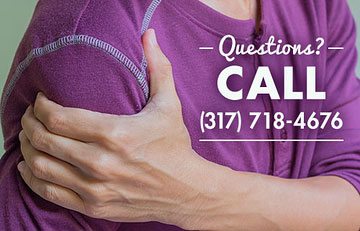
Whether you’re throwing a ball on the athletic field, or reaching to pick up your grandchild, your shoulders are key to your body’s mobility. Shoulders consist of several joints that – combined with tendons and muscles – allow a wide range of motion in your arms.
Causes of shoulder pain, strain, stiffness, and other injuries can originate from a multitude of sources, depending on age and activity.
Why Hendricks?
Our staff is highly skilled in diagnosing and treating shoulder injuries—and ensure your continued care is comfortable and effective. At Hendricks, we offer award-winning patient care and shoulder services including:
- Streamlined electronic medical record system, delivering information when it's needed
- Highly coordinated physical therapists, nurses, and orthopedic surgeons
- Physical therapy, localized pain treatments, minor and major surgery for repairs
- Continued support during the entire recovery process
Shoulder Pain Symptoms and Treatment
Rotator Cuff Injuries
The rotator cuff is a group of muscles in your upper arm that enable you to raise and rotate the arm. Rotator cuff issues are common shoulder injuries for all ages, and it can be injured or torn after falling, or by trying to lift or catch a heavy object with an extended arm. Sometimes, the rotator cuff becomes injured over time with repetitive activity. Symptoms of a torn rotator cuff include tenderness and soreness in the shoulder. You may not be able to raise the arm at all, it may be hard to sleep lying on that side, or the pain might be so intense that it causes you trouble falling asleep—and wakes you up at night. Also, you may feel pain when pressure is placed on your shoulder or when driving a car. Even putting on a shirt can be painful and difficult. Weightlifters and athletes might also experience a labrum tear, which feels like a catching, locking, or grinding in the shoulder joint.
Treatment depends on the severity of the injury, and may include medications and rest, physical therapy, steroid injections, and/or surgery. Not to worry—we'll get you on the right track to recovery.
Shoulder Pain from Arthritis
Starting as early as age 50, people may develop osteoarthritis, which can cause painful movement, swelling, and stiffness. This occurs as the smooth surfaces of the cartilage that line the bones of the shoulder joint are worn away. According to the American Academy of Orthopaedic Surgeons, osteoarthritis may be related to sports or work injuries, as well as chronic wear and tear. Other types of arthritis can be related to rotator cuff tears or inflammation. Treatments by our staff for arthritis in the shoulder depend on the severity of your pain. The usual treatments are rest, medications to help with inflammation, and cortisone injections. In some cases, a replacement of the shoulder joint is needed. To learn more about our arthritis specialties, view here.
Shoulder Injury from Overuse or Underuse
A sudden increase in activity can place great stress on the shoulders and lead to strain or loss of flexibility. This problem becomes more common as we age, and can also occur with "weekend warriors" who don't exercise regularly, but occasionally participate in an intense sport or activity. Adversely, prolonged immobility of the joint can lead to conditions like frozen shoulder, usually due to inactivity post-treatment. Although painful and inconvenient, overuse or stiffness problems can often be treated with rest, medications, and physical therapy. Sometimes, surgery may be needed to correct the problem.
Shoulder Arthroscopy (Scope)
Our orthopedic physicians use arthroscopy to look inside your shoulder joint with a special camera. An arthroscope is a small, tube-shaped instrument used to look inside a joint. One key benefit to arthroscopy is that it often can show soft tissue injuries that are not obvious in other diagnostic tests. During this procedure, our surgeons can often both find the cause of your shoulder pain, as well as correct it.